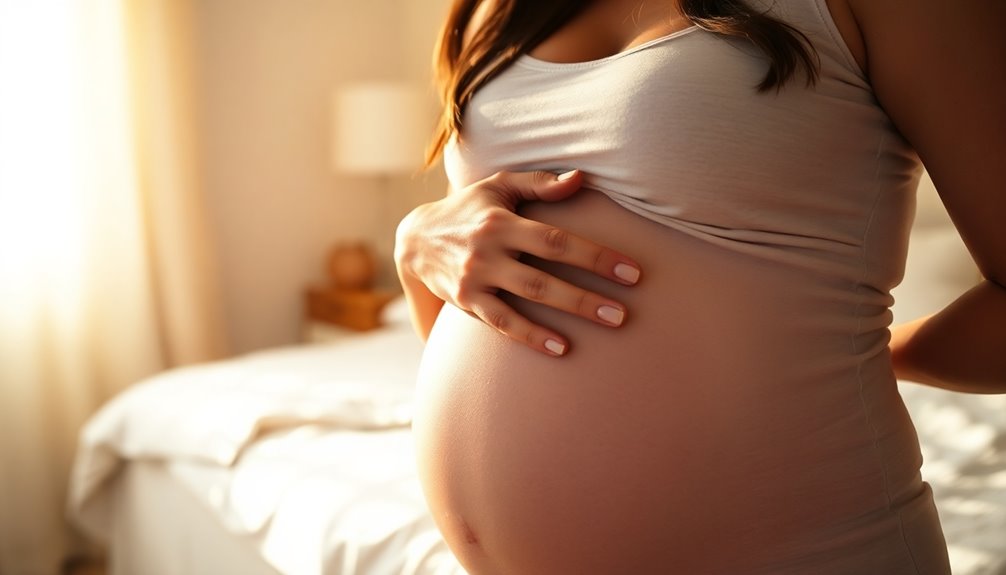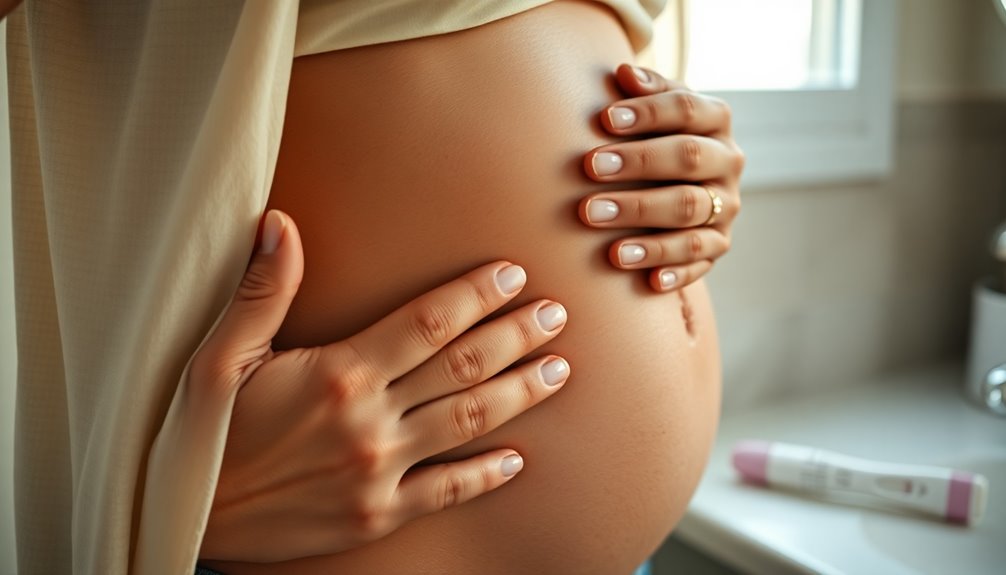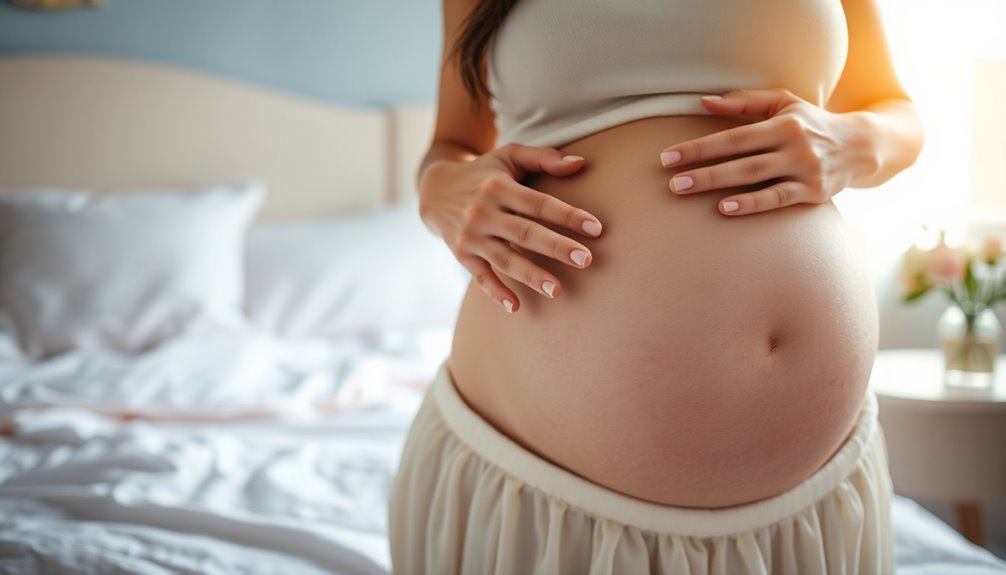An increase in sexual desire can indeed be a sign of pregnancy. During early pregnancy, hormonal changes ramp up estrogen and progesterone levels, often leading to heightened sexual interest. You might experience increased sensitivity and pleasure due to enhanced blood flow to your sexual organs. It's common to feel a sense of excitement in the first and second trimesters, but it's important to communicate with your partner about any changes. Discover more about these fascinating changes and how they affect intimacy.
Key Takeaways
- An increase in sexual desire can occur due to hormonal changes, particularly elevated estrogen and progesterone levels during early pregnancy.
- Heightened sensitivity and pleasure from increased blood flow to sexual organs often lead to a more active sex life in the first trimester.
- Emotional connections may deepen during pregnancy, enhancing intimacy and potentially resulting in increased sexual interest.
- Physical changes, such as improved lubrication, contribute to a greater likelihood of experiencing pleasure and reaching orgasm.
- Fluctuations in libido are common throughout pregnancy, with heightened desire typically seen in the first and second trimesters.
Understanding Hormonal Changes During Pregnancy

As you navigate through pregnancy, understanding the hormonal changes can help you make sense of your shifting sexual desire.
During this time, estrogen and progesterone levels surge, especially in the first trimester. This increase can heighten your sexual desire, often linked to enhanced sensitivity in your genitals and breasts.
As estrogen and progesterone levels rise in early pregnancy, many women experience heightened sexual desire and increased sensitivity.
As early pregnancy symptoms like nausea fade and your energy levels rise, many women notice a significant boost in libido during the late first trimester and into the second.
However, those hormonal fluctuations may also lead to varying levels of sexual interest.
It's important to remember that these emotional and physical changes create a unique context, influencing your intimacy with your partner throughout your pregnancy journey.
Increased Sensitivity and Blood Flow

Hormonal changes during pregnancy set the stage for increased sensitivity and blood flow, which can greatly enhance your sexual experience.
As blood flow to your sexual organs, breasts, and vulva increases, you might notice heightened sensitivity and more pleasurable sensations during intimacy. This increased blood flow often leads to greater vaginal lubrication, making it easier to reach orgasm and enjoy intense pleasure.
You may also experience physical sensations like nipple leakage, which can stimulate your sexual desire even further. Embracing these physiological changes can deepen intimacy with your partner, allowing you to explore this new phase of your sexuality.
Heightened Libido in the First Trimester

During the first trimester, you might notice a surge in your libido, thanks to hormonal changes like increased estrogen and progesterone.
Enhanced blood flow can heighten sensitivity, making intimate moments feel even more pleasurable.
Coupled with a deepening emotional connection with your partner, this period can lead to a more fulfilling sexual experience. Additionally, understanding your budgeting plan during this time can help alleviate financial stress, allowing you to focus on your relationship and well-being.
Hormonal Changes Impacting Libido
While you navigate the exciting changes of early pregnancy, you might notice a surprising surge in your sexual desire. This heightened libido during the first trimester is largely due to hormonal changes, especially the increased levels of estrogen and progesterone.
These hormones not only enhance your emotional connection with your partner but also make physical intimacy feel more pleasurable. You may experience breast tenderness and heightened sensitivity, which can further amplify your arousal.
Many women find that their sexual thoughts dominate daily activities, reflecting how your body responds to these hormonal shifts. Embracing this newfound desire can be a beautiful part of your pregnancy journey, allowing for deeper intimacy and connection with your partner.
Increased Blood Flow Effects
As your body undergoes the remarkable changes of early pregnancy, increased blood flow to the genital area can greatly heighten your sexual desire.
This surge in blood flow enhances sensitivity, leading many women to experience heightened libido during the first trimester. Alongside this, rising hormone levels, particularly estrogen and progesterone, contribute considerably to increased arousal and sexual desire, often felt as early as the first few weeks.
You might notice greater vaginal lubrication and heightened sensitivity in the clitoris, thanks to this increased blood flow.
These physical changes can create a unique sexual dynamic, making you feel more connected and sexually active. Embracing these changes can lead to a more fulfilling intimate experience during this transformative time.
Emotional Connection Enhancement
The heightened libido many women experience in the first trimester isn't just about physical sensations; it also plays a significant role in deepening emotional connections with partners.
As hormonal changes surge, particularly with increased estrogen and progesterone, you may find that your emotional connection with your partner becomes more intense. This heightened libido can amplify feelings of intimacy, making sexual experiences not only pleasurable but also emotionally fulfilling.
The increased blood flow enhances sensitivity, allowing you to explore new dimensions of closeness. Additionally, the shared experience of pregnancy fosters a unique bond, leading to a sense of liberation and confidence in your body.
Embracing this opportunity can strengthen your relationship through deeper emotional connections and fulfilling intimacy. Furthermore, cultivating positive environments during this time can enhance both emotional and physical intimacy, contributing to a supportive and loving relationship.
The Honeymoon Phase: Second Trimester Experiences

During the second trimester, many women find themselves entering a "honeymoon phase" where sexual desire often peaks.
You might notice that the discomforts of the first trimester, like nausea and fatigue, have lessened, paving the way for a more enjoyable sex life. Increased blood flow leads to heightened sensitivity and increased vaginal lubrication, making sensations more intense—some even experience multiple orgasms.
This period fosters emotional closeness with your partner, enhancing your connection through intimacy. As your body changes, embracing these feelings can strengthen your bond and create a fulfilling sexual experience.
Enjoy this time, as the second trimester often brings a renewed excitement and passion that can make your pregnancy journey even more special.
Third Trimester Considerations and Safety

As you enter the third trimester, it's crucial to contemplate how physical changes might affect your sexual experiences.
Communicating openly with your partner about comfort and preferences can help manage any discomfort during intercourse.
Safe Sexual Practices
While many couples find sexual activity safe and enjoyable in the third trimester, it's crucial to prioritize communication and comfort.
You should consult your doctor if you experience any bleeding or complications. Remember, it's safe to have sex unless advised otherwise.
Consider these tips for safe sexual practices:
- Discuss comfort levels: Regularly communicate with your partner about what feels good and what doesn't.
- Use protection: If you're not in a monogamous relationship, using condoms can prevent sexually transmitted infections (STIs).
- Check in with your doctor: Regular healthcare visits can guarantee that your sexual activity remains safe throughout this stage. Additionally, being aware of safe sexual practices can help ensure a positive experience during pregnancy.
Managing Discomfort During Intercourse
Many couples enjoy intimacy throughout the third trimester, but it's common to face some discomfort due to physical changes. Weight gain and back pain can make intercourse less comfortable, which may lead to decreased sexual activity.
However, engaging in sexual activity can still be beneficial. Orgasm and nipple stimulation may release oxytocin, potentially aiding in labor. If you experience cramping post-intercourse, it's usually normal, but severe pain or bleeding warrants a call to your healthcare professional.
Remember, sexual activity is generally safe unless specific medical issues arise, so discussing any concerns with your doctor is essential.
If you're not in a monogamous relationship, using condoms is a good idea to prevent STI transmission, especially as vaginal sensitivity often increases during pregnancy.
Communication With Partner
How can you guarantee that both you and your partner feel comfortable discussing intimacy during the third trimester? Open communication is key. As feelings about sexual activity can change, it's crucial to regularly check in with each other. This guarantees you're both comfortable and satisfied.
- Discuss any physical discomfort or concerns openly.
- Acknowledge that feelings about sex may evolve without self-judgment.
- Consult with a doctor for reassurance regarding safety during intimacy.
Navigating these conversations can strengthen your bond and foster understanding. Make it a priority to share your thoughts and listen to your partner's feelings, creating a supportive environment where both of you can openly express your needs and desires. Additionally, maintaining a healthy lifestyle can positively influence your overall well-being and intimacy during this time.
Emotional Connection and Body Acceptance

As you navigate the journey of pregnancy, you might find that the emotional connection with your partner deepens considerably. Hormonal changes often intensify feelings of intimacy, making you more attuned to each other's needs.
Embracing your body's transformations can lead to greater body acceptance, allowing you to appreciate your fuller figure and enhanced curves. This newfound confidence can positively impact your relationship, creating a more relaxed atmosphere free from contraception stress.
Open communication about your evolving feelings towards sex and body image strengthens your bond, promoting a healthier intimate life. By focusing on your emotional connection and celebrating body acceptance, you'll likely find that your relationship flourishes during this transformative time.
Navigating Changes in Sexual Desire

Your emotional connection and body acceptance can greatly influence how you experience sexual desire during pregnancy.
Emotional connection and body acceptance are key to experiencing sexual desire during pregnancy.
In early pregnancy, heightened hormone levels, particularly estrogen and progesterone, can lead to increased sexual desire. As nausea fades and energy levels rise, many women find themselves in a "honeymoon phase," enjoying a more active sex life.
- You might notice heightened sensitivity and pleasure.
- Emotional intimacy often deepens, elevating your sexual interest.
Keep in mind, libido can fluctuate; it's common to experience decreased desire in the third trimester.
Understanding these changes helps you navigate your evolving feelings about sex during this transformative time in your life.
Embrace the journey and communicate openly with yourself about your needs and desires.
Communication With Your Partner

Maneuvering the complexities of sexual desire during pregnancy often prompts the question: how can you effectively communicate with your partner? Open communication is crucial, helping both of you understand each other's feelings and needs.
Use "I feel" statements to express your preferences and comfort levels, which can lead to more meaningful discussions. Regular check-ins about emotional and physical intimacy are essential, allowing you to navigate the evolving dynamics of your relationship.
Acknowledging the unique experiences of each pregnancy fosters a non-judgmental atmosphere, encouraging honest conversations about fluctuating sexual desire. By emphasizing emotional connection and support, you can strengthen intimacy and enhance overall relationship satisfaction during this transformative time.
Don't underestimate the power of dialogue; it's key to a harmonious experience.
Other Factors Influencing Libido During Pregnancy

While pregnancy often brings about heightened sexual desire for some women, various factors can influence libido in complex ways. Hormonal fluctuations play a significant role, especially with increases in estrogen and progesterone during the first and second trimesters.
However, your mental health and stress levels can also impact your libido. It's important to reflect on how you're feeling overall.
- Increased body confidence may enhance sexual desire.
- Anxiety or depression can lead to decreased libido.
- Quality of sleep is vital; poor sleep can dampen sexual responsiveness.
- Engaging in effective relaxation techniques can help alleviate stress and improve overall well-being.
Being aware of these factors can help you navigate your sexual feelings more effectively during pregnancy, ensuring a fulfilling experience for both you and your partner.
Frequently Asked Questions
Can a Pregnant Woman Have Sexual Urges?
Absolutely, a pregnant woman can have sexual urges. Hormonal changes during pregnancy often boost libido, especially in the first and second trimesters.
You might notice heightened sensitivity and arousal due to increased blood flow to your sexual organs. Emotional factors, like feeling good about your body and reduced worries about contraception, can also play a role.
However, remember that libido can fluctuate, and it's normal to experience changes throughout your pregnancy.
Why Am I Suddenly Hornier Than Usual?
You're experiencing a surge of desire, like a flower blooming in spring.
This sudden horniness could be due to hormonal shifts, which heighten sensitivity and arousal. Your body's responding to these changes, much like a river swelling with rain.
Emotional factors, like newfound body confidence or freedom from contraception, might also play a role.
What Are the Signs That You Have Conceived?
If you've conceived, you might notice several early signs. A missed period is usually the first indicator.
You could also experience nausea, breast tenderness, and increased urination. Fatigue and mood swings might hit you, too.
Additionally, cravings or food aversions can emerge around three weeks after conception. Each person's experience varies, so pay attention to your body's signals.
If you suspect pregnancy, consider taking a test for confirmation.
What Are the Hidden Signs of Pregnancy?
Pregnancy can feel like a rollercoaster of emotions and changes. Beyond the obvious signs, you might notice hidden ones sneaking in, like mood swings that twist your feelings like a whirlwind.
You could experience tender breasts, increased urination, or even that familiar morning nausea. Some women find their sense of smell sharpens, turning ordinary scents into overwhelming sensations.
Keep an eye out; these subtle cues can whisper secrets about what's happening inside you.
Conclusion
Increased sexual desire during pregnancy can feel as surprising as a sudden summer storm, invigorating yet unpredictable. As your body changes, so does your intimacy, and it's important to embrace these shifts together. Communicating openly with your partner helps navigate this evolving landscape, ensuring both of you feel connected and supported. Remember, every pregnancy is unique, so trust your instincts and enjoy this remarkable journey of love and discovery. Embrace the ride, and cherish each moment!









